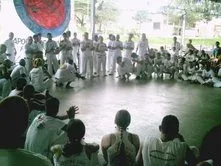UNESDOC Database: Coleção História Geral da África em português
Brasília: UNESCO, Secad/MEC, UFSCar, 2010.
Resumo: Publicada em oito volumes, a coleção História Geral da África está agora também disponível em português. A edição completa da coleção já foi publicada em árabe, inglês e francês; e sua versão condensada está editada em inglês, francês e em várias outras línguas, incluindo hausa, peul e swahili. Um dos projetos editoriais mais importantes da UNESCO nos últimos trinta anos, a coleção História Geral da África é um grande marco no processo de reconhecimento do patrimônio cultural da África, pois ela permite compreender o desenvolvimento histórico dos povos africanos e sua relação com outras civilizações a partir de uma visão panorâmica, diacrônica e objetiva, obtida de dentro do continente. A coleção foi produzida por mais de 350 especialistas das mais variadas áreas do conhecimento, sob a direção de um Comitê Científico Internacional formado por 39 intelectuais, dos quais dois terços eram africanos.
Download gratuito (somente na versão em português):
ISBN: 978-85-7652-123-5
ISBN: 978-85-7652-124-2
ISBN: 978-85-7652-125-9
ISBN: 978-85-7652-126-6
ISBN: 978-85-7652-127-3
ISBN: 978-85-7652-128-0
ISBN: 978-85-7652-129-7
ISBN: 978-85-7652-130-3
UNESDOC Database – http://www.unesco.org/new/en/unesco/resources/online-materials/publications/unesdoc-database/
UNESCO works to create the conditions for dialogue among civilizations, cultures and peoples, based upon respect for commonly shared values. It is through this dialogue that the world can achieve global visions of sustainable development encompassing observance of human rights, mutual respect and the alleviation of poverty, all of which are at the heart of UNESCO’S mission and activities.
The broad goals and concrete objectives of the international community – as set out in the internationally agreed development goals, including the Millennium Development Goals (MDGs) – underpin all UNESCO’s strategies and activities. Thus UNESCO’s unique competencies in education, the sciences, culture and communication and information contribute towards the realization of those goals.
UNESCO’s mission is to contribute to the building of peace, the eradication of poverty, sustainable development and intercultural dialogue through education, the sciences, culture, communication and information. The Organization focuses, in particular, on two global priorities:
And on a number of overarching objectives:
- Attaining quality education for all and lifelong learning
- Mobilizing science knowledge and policy for sustainable development
- Addressing emerging social and ethical challenges
- Fostering cultural diversity, intercultural dialogue and a culture of peace
- Building inclusive knowledge societies through information and communication








